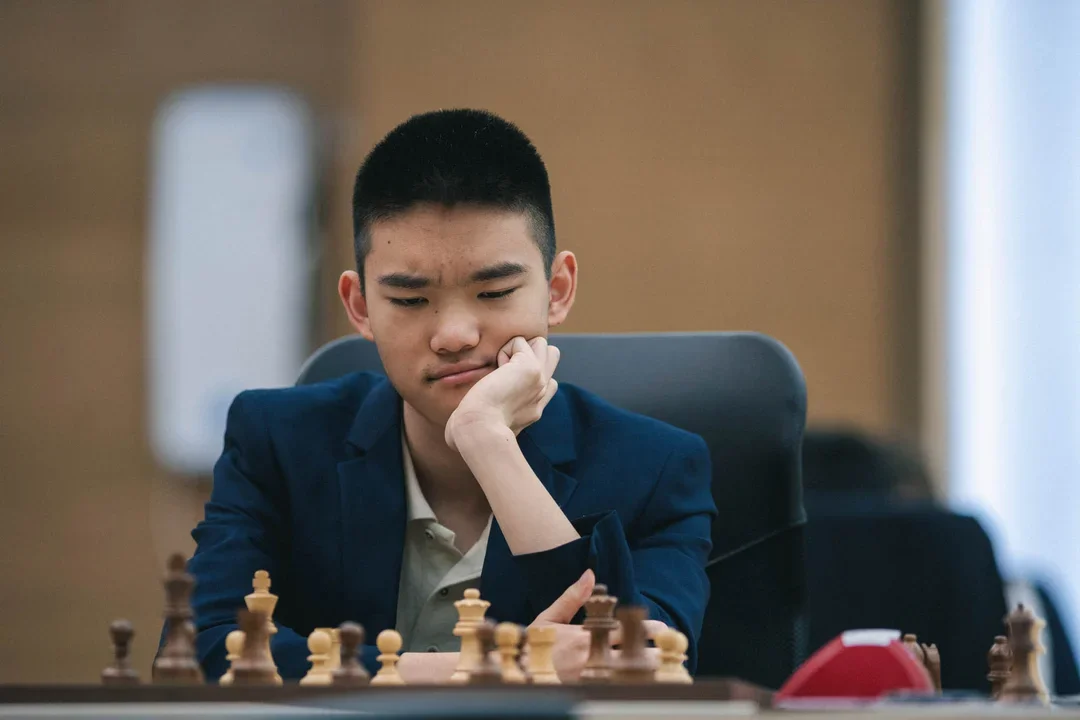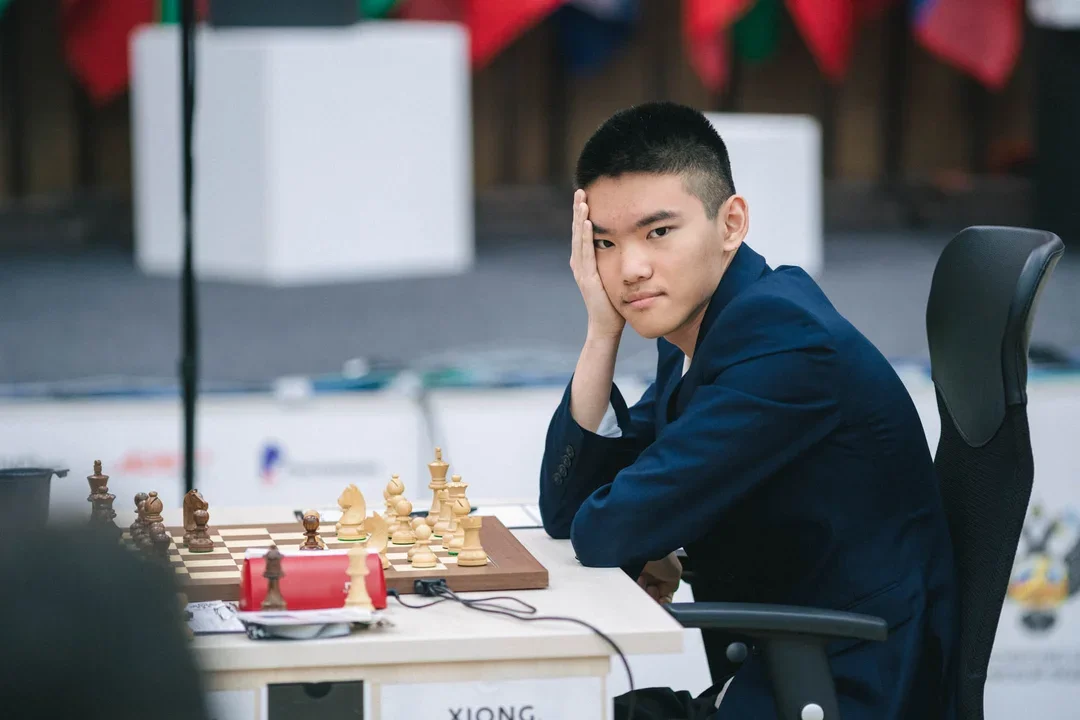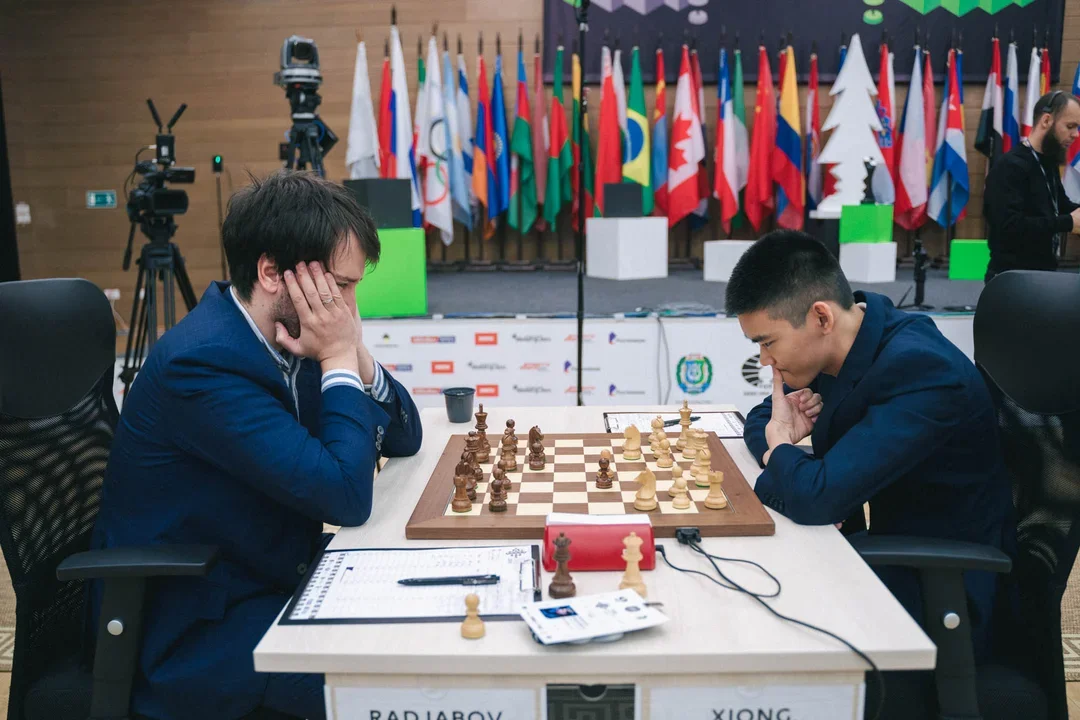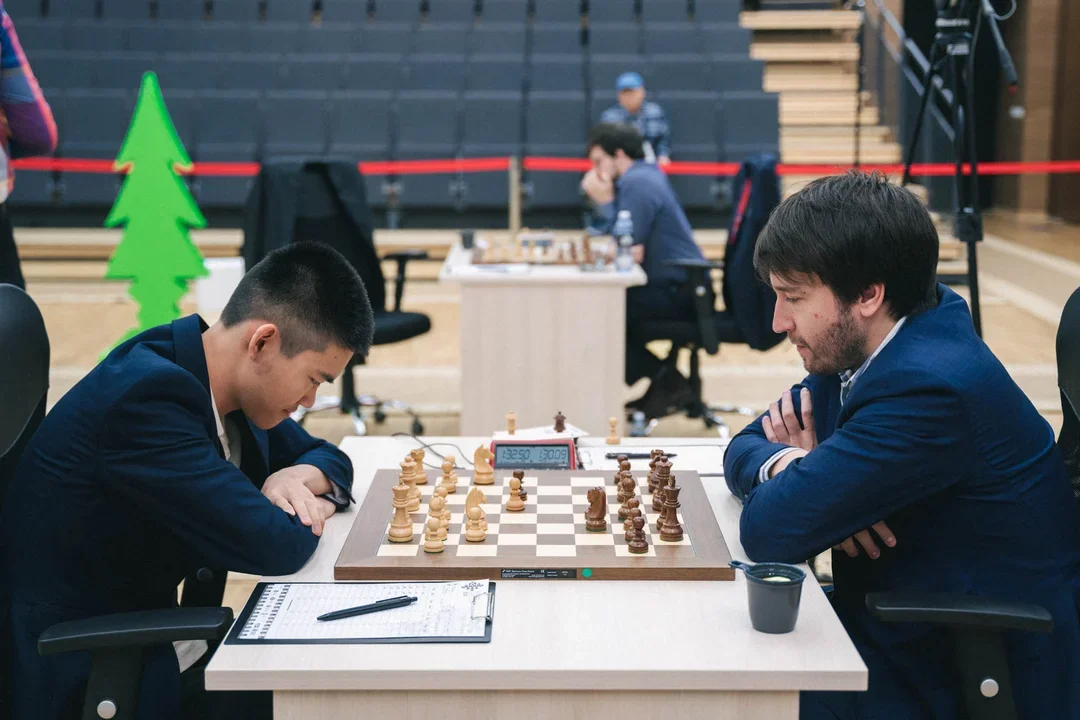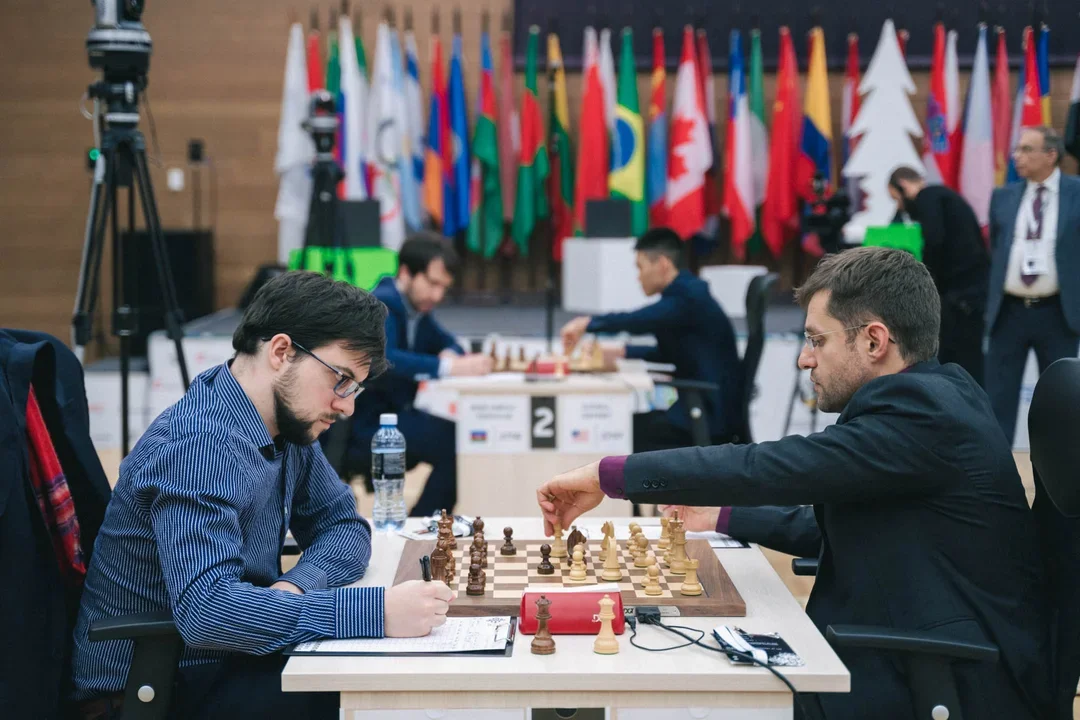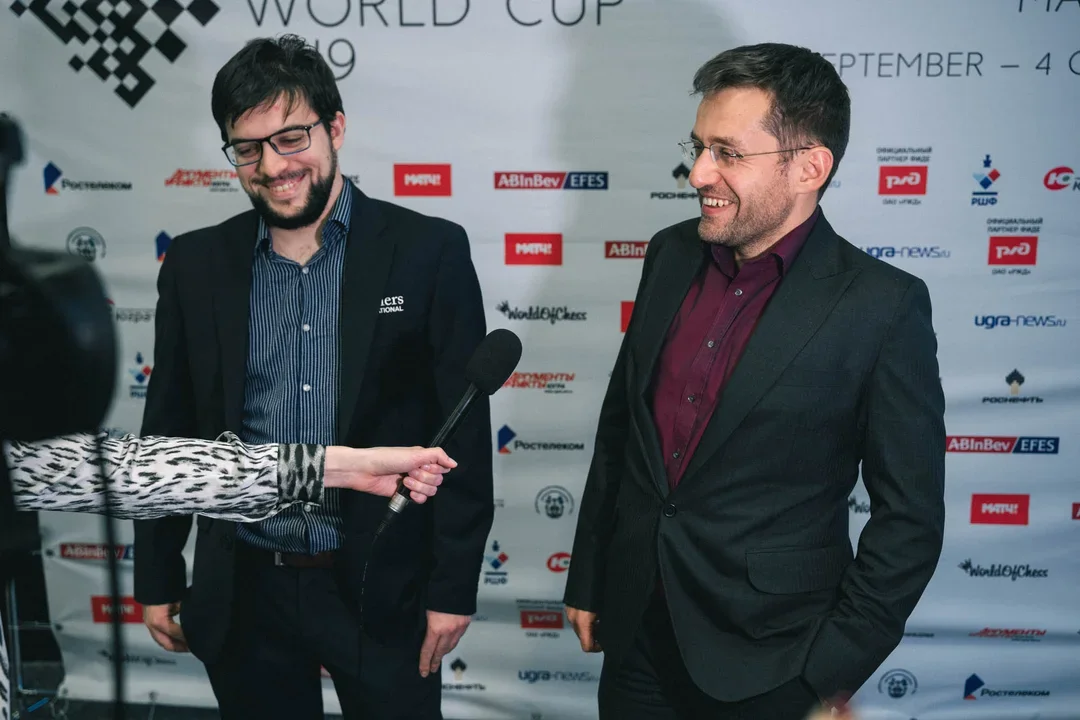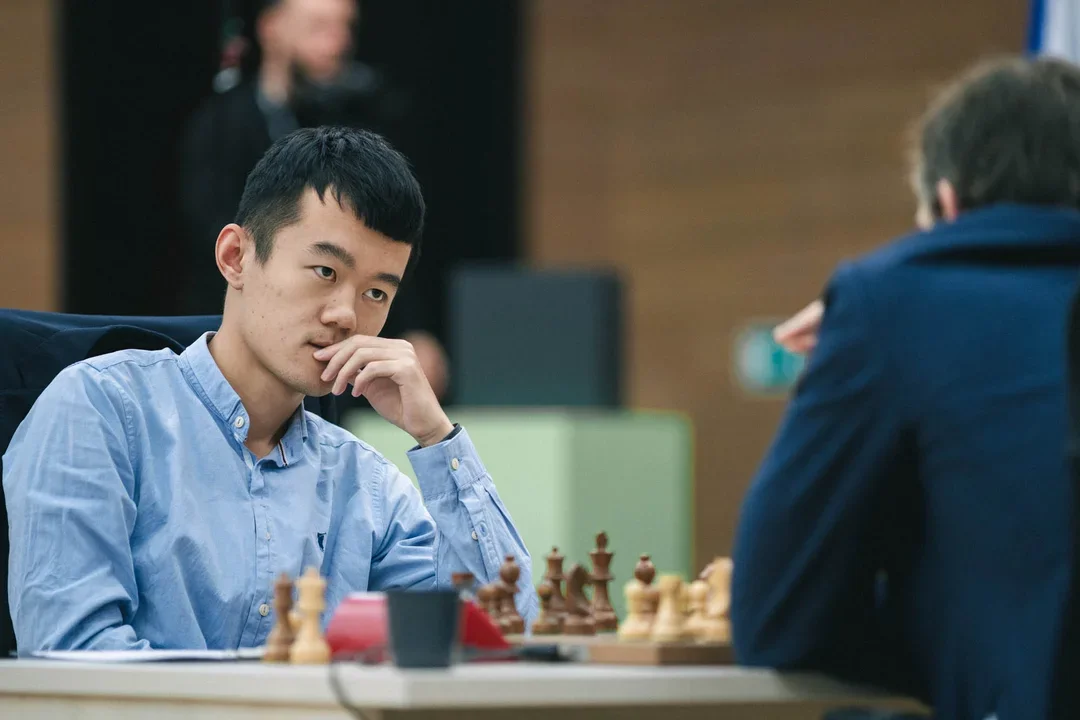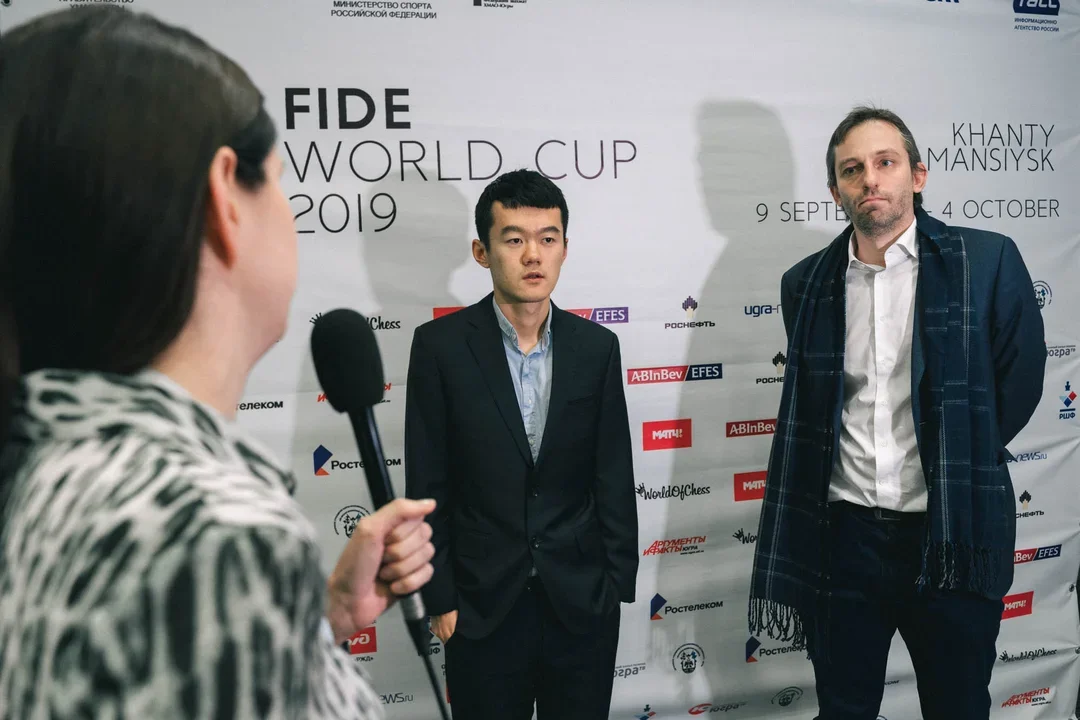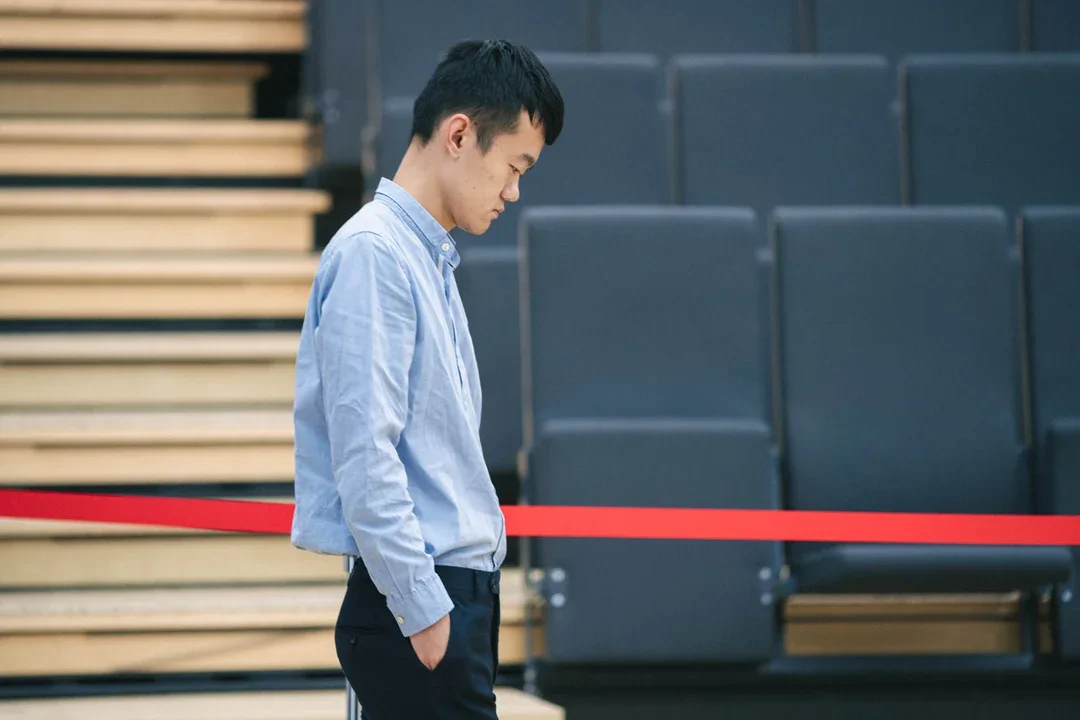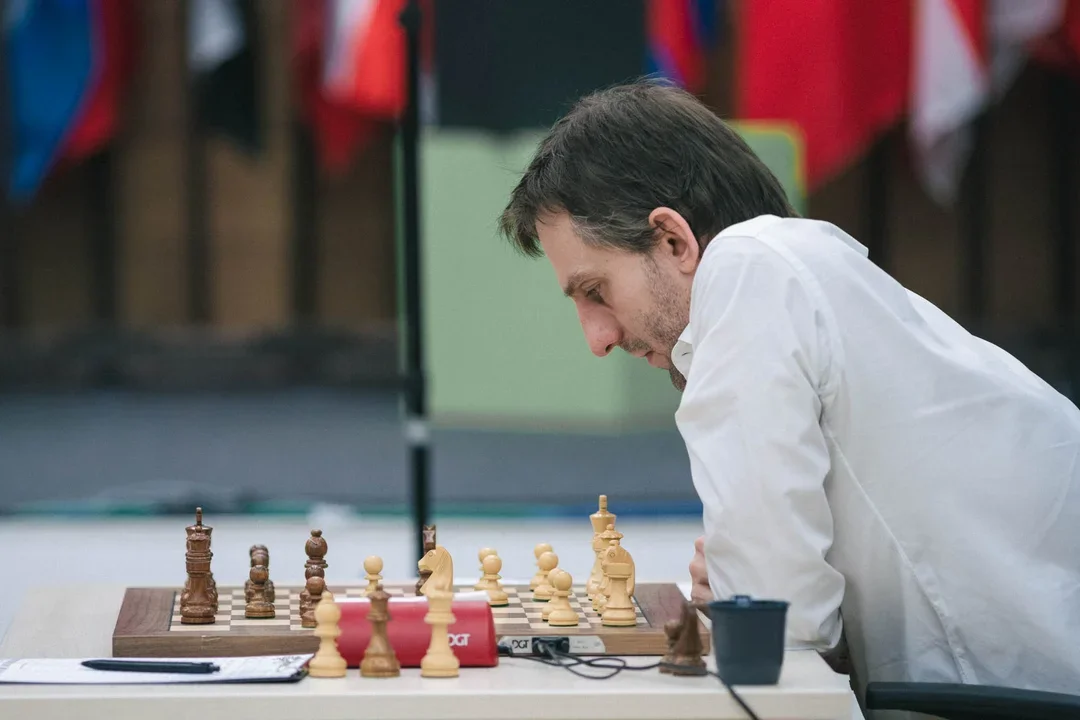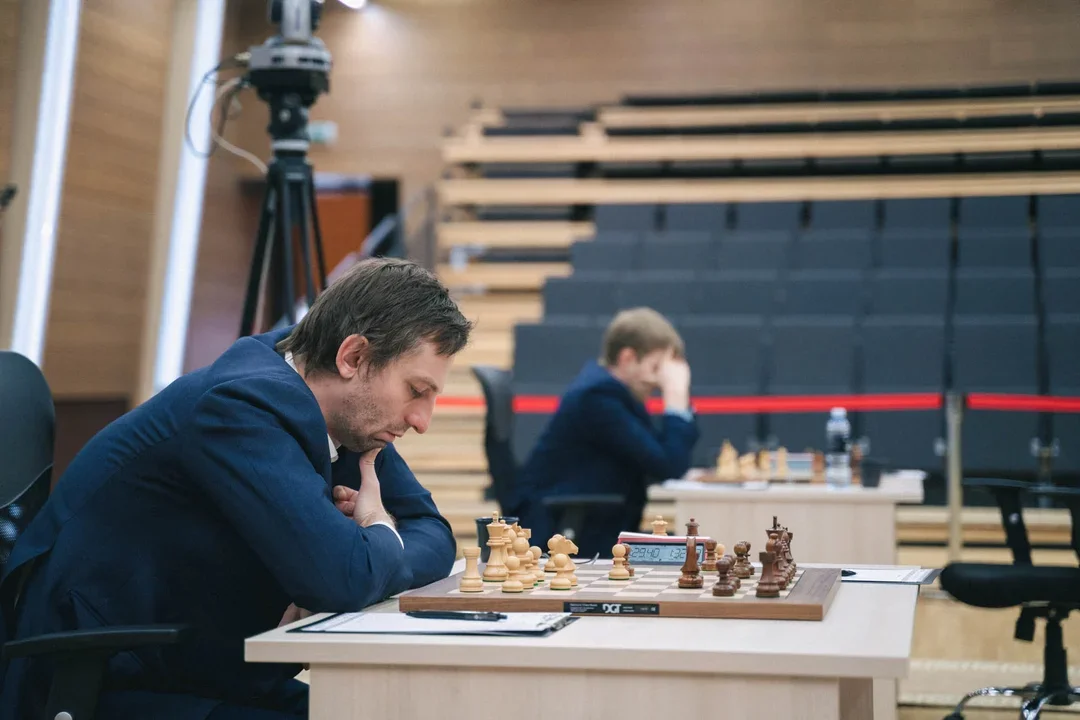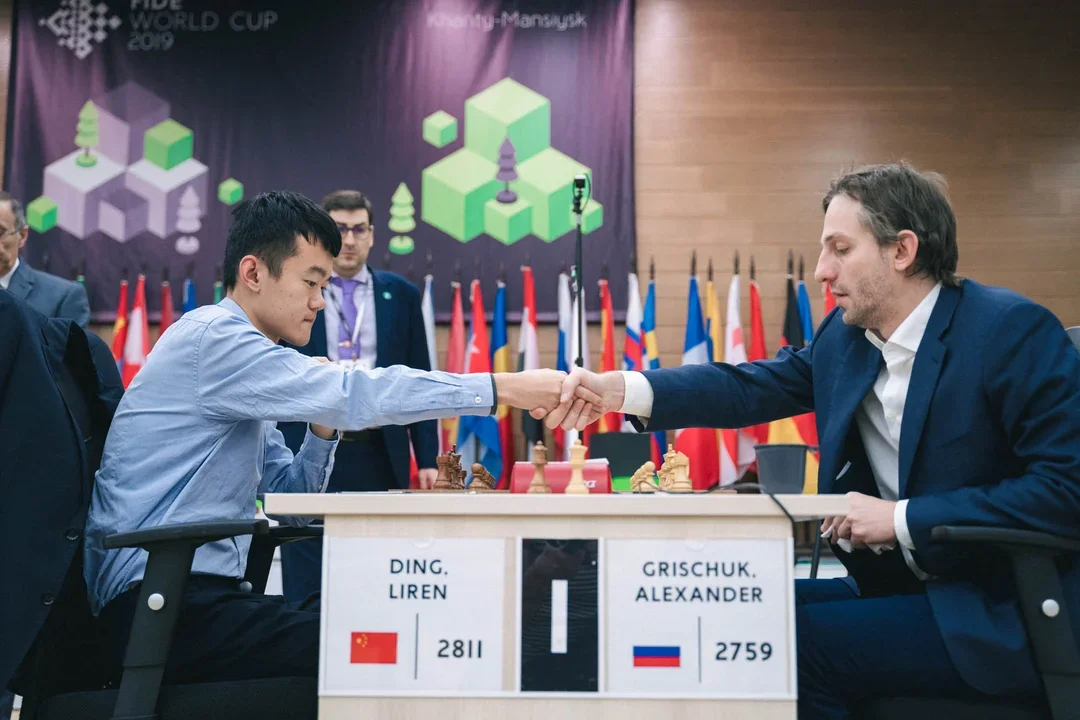It has been 13 days since the first moves were played at the 2019 FIDE World Cup. 120 of the 128 competitors have been eliminated, and the eight quarterfinalists that remain have played a minimum of 10 games against elite competition. American Jeffery Xiong tops the list with 20 games (including playoffs) in Khanty-Mansiysk coming into Monday’s play.
But the players keep fighting. While today’s first leg of the quarterfinal round saw four draws, only one – Xiong-Radjabov – could be considered largely bloodless. The other three saw varying degrees of complexity and gusto.
Vachier-Lagrave had to play precisely to get to a drawn opposite-colored bishops ending against Aronian. Vitiugov had to survive a tough opening and a dynamic exchange sac from Yu Yangyi to split the point. And Ding Liren essayed a fascinating exchange sac of his own against Alexander Grischuk, the bishop pair proving more than strong enough to hold the draw.
After a grueling playoff on Sunday, Jeffery Xiong chose a quiet sideline in the Open Catalan against Teimour Radjabov. With pieces leaving the board at a rapid pace, the players repeated moves and drew at the 30 move mark. IM John Watson annotates the game exclusively for CLO.
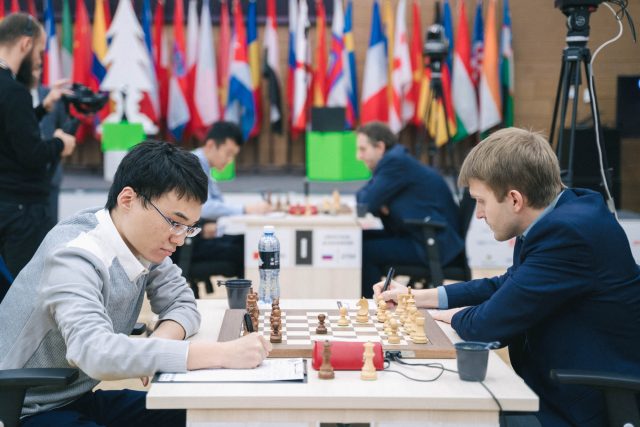 Vitiugov-Yu Yangyi (photo Kiriill Merkuryev)
The final game to end was the battle between Nikita Vitiugov and Yu Yangyi. Vitiugov tried the quiet 6.g3 against Yu’s Najdorf, and managed to get a decent position before Black began to generate counterplay with his bishops. The computer does not care for Yu’s plan after 32…Rxf2, but his exchange sacrifice gave him a powerful bishop pair and enough compensation to share the point.
Vitiugov-Yu Yangyi (photo Kiriill Merkuryev)
The final game to end was the battle between Nikita Vitiugov and Yu Yangyi. Vitiugov tried the quiet 6.g3 against Yu’s Najdorf, and managed to get a decent position before Black began to generate counterplay with his bishops. The computer does not care for Yu’s plan after 32…Rxf2, but his exchange sacrifice gave him a powerful bishop pair and enough compensation to share the point.
FIDE World Cup Quick links 2019 World Cup Official Webpage Pairings and Results Live YouTube Coverage (daily, 6am EDT)
[pgn]
[Event "FIDE World Cup 2019"]
[Site "Khanty-Mansiysk"]
[Date "2019.09.23"]
[Round "5.1"]
[White "Xiong, Jeffery"]
[Black "Radjabov, Teimour"]
[Result "1/2-1/2"]
[ECO "E05"]
[WhiteElo "2707"]
[BlackElo "2758"]
[Annotator "John Watson"]
[PlyCount "60"]
[EventDate "2019.??.??"]
{Not a particularly interesting game, but an example of professional chess.
After the excitement of the past few days, Jeffrey probably wasn't interested
in any adventures, preferring to rest for the upcoming challenges.} 1. d4 Nf6
2. c4 e6 3. g3 d5 4. Bg2 Be7 5. Nf3 O-O 6. O-O dxc4 7. Na3 {Not as popular as}
(7. Qc2 {or}) (7. Ne5 {. 7 Na3 is a safe move which, however, hasn't been
producing many advantages on the master level.}) 7... Bxa3 8. bxa3 Bd7 {
A relatively simple solution which has become the main move in recent praxis.}
(8... Nc6 {,}) (8... Nbd7 {, and even}) (8... b5 {are playable alternatives.})
9. Ne5 (9. Qc2 Bc6 10. Qxc4 Nbd7 {keeps more play on the board, but has proven
equal for Black.}) 9... Bc6 10. Nxc6 Nxc6 11. Bxc6 {This leads to a fully
equal position without many challenges for either side.} (11. Bb2 {is almost
always played, but Black's results have been good after} Nd5) 11... bxc6 12.
Bg5 h6 (12... c5 {is also fine, with the idea} 13. dxc5 h6 $11) (12... Qd5 13.
Bxf6 gxf6 14. Rc1 (14. e3 Rab8) 14... Rfd8 15. e3 c5 $11 {was Iljin,T (2322)
-Enkhnar,E (2438) Alushta 2016.}) 13. Bxf6 $1 Qxf6 14. Rc1 (14. e3 c5 15. dxc5
Rab8) 14... c5 $1 (14... Rfd8 15. Rxc4 c5 $1 16. Rxc5 Rxd4 17. Qc2 Rad8 18.
Rxc7 Rd2 {also equalizes.}) 15. dxc5 (15. Rxc4 cxd4 16. Qxd4 Qxd4 17. Rxd4 Rfd8
$11) 15... Qb2 (15... Rfd8 16. Qc2 Qe5 $1 17. Qxc4 Rd2 18. e3 Rad8 $11 {
is another solution.}) 16. Rxc4 Qxa2 (16... Rfd8 17. Qc2 Rab8 18. Rd1 {1/2-1/2
was Graf,H (2148)-Nilson,B (2174), ICCF 2010.}) 17. Ra4 Rad8 18. Qc1 Qxe2 19.
Rxa7 c6 20. Re1 (20. Rc7 Qf3 (20... Rd5 21. Rxc6 Rfd8 $11) 21. Qe3 Qd5 22. Rc1
Ra8 $11) 20... Qa2 21. Rd1 Rxd1+ 22. Qxd1 Qc4 23. Qd6 Qe4 $1 24. h4 {There's
no reason to avoid a draw.} Qe1+ 25. Kg2 Qe4+ 26. Kg1 Qe1+ 27. Kg2 Qe4+ 28. Kh2
Qf5 29. Kg1 Qb1+ 30. Kg2 Qe4+ 1/2-1/2
[/pgn]
Post-match interview with Radjabov and Jeffery Xiong:
https://www.youtube.com/watch?v=_tt2VKBoZuI
Levon Aronian tried to topple Maxime Vachier-Lagrave’s Grunfeld, but it continues to be a tough nut to crack!
[pgn] [Event "FIDE World Cup 2019"] [Site "Khanty-Mansiysk RUS"] [Date "2019.09.23"] [Round "5.1"] [White "Aronian, Levon"] [Black "Vachier-Lagrave, Maxime"] [Result "1/2-1/2"] [ECO "D91"] [WhiteElo "2758"] [BlackElo "2774"] [PlyCount "88"] [EventDate "2019.09.10"] [EventType "k.o."] 1. d4 Nf6 2. c4 g6 3. Nc3 d5 4. Nf3 Bg7 5. Bg5 Ne4 6. Bf4 Nxc3 7. bxc3 c5 8. cxd5 Qxd5 9. e3 O-O 10. Be2 cxd4 11. cxd4 Nc6 12. O-O Bf5 13. Qa4 Qa5 14. Qxa5 Nxa5 15. Nd2 Rac8 16. Rfc1 Rxc1+ 17. Rxc1 Rc8 18. Rxc8+ Bxc8 19. Bf3 Nc6 20. Bxc6 bxc6 21. Bb8 a6 22. Ne4 f6 23. f3 Kf7 24. Kf2 Bf8 25. Ba7 f5 26. Ng5+ Ke8 27. f4 Bh6 28. Nxh7 Be6 29. a3 a5 30. Ke2 Bg8 31. Ng5 Bxg5 32. fxg5 a4 33. Kd3 Bb3 34. Kc3 Kf7 35. Kb4 Bc2 36. Bb8 Bb3 37. h4 Kg7 38. e4 fxe4 39. Bf4 e3 40. Bxe3 Kf7 41. g4 Bd1 42. h5 e6 43. Bf4 Kg7 44. Be5+ Kh7 1/2-1/2 [/pgn]Certainly the highlight of the day was the game between Alexander Grischuk and Ding Liren. Grischuk appears to have intended to sac an exchange on the 15th move, but Ding beat him to the punch with 14…Rb6!?, after which the game became immensely difficult to parse. The key ideas seem to have amused Ding, as this video tweet from Olimpiu Urcan clearly shows. https://twitter.com/olimpiuurcan/status/1176136448421974017 IM John Watson has done his best to make sense of the complications in these notes for CLO.
[pgn]
[Event "FIDE World Cup 2019"]
[Site "Khanty-Mansiysk"]
[Date "2019.09.23"]
[Round "5.1"]
[White "Grischuk, Alexander"]
[Black "Ding, Liren"]
[Result "1/2-1/2"]
[ECO "E04"]
[WhiteElo "2759"]
[BlackElo "2811"]
[Annotator "John Watson"]
[PlyCount "82"]
[EventDate "2019.??.??"]
1. d4 Nf6 2. c4 e6 3. Nf3 d5 4. g3 dxc4 5. Bg2 a6 6. O-O Nc6 7. e3 Rb8 8. Nfd2
({Earlier in the tournament, White tested the gambit line} 8. Qe2 b5 9. b3 cxb3
10. axb3 {in Nakamura-Bellahcene.}) 8... e5 9. Bxc6+ bxc6 10. dxe5 Ng4 11. Nxc4
{There have been scores of games from this position over the past few years.}
Be6 (11... Qxd1 12. Rxd1 Be6 13. Nbd2 {gives White a considerable positional
advantage, e.g.,} Rd8 14. b3 Bxc4 15. bxc4 Nxe5 16. Bb2 $16) 12. Qe2 (12. Nbd2
{has been the main move, but some very strong players have played} h5 $1 {
with the idea} 13. f3 Rb4 $1 14. Qe2 ({Black has held the draw recently after}
14. fxg4 Bxc4 15. Nxc4 Qxd1 16. Rxd1 Rxc4) 14... h4 $1 15. fxg4 hxg3 {, and
the computer already calls it equal, in view of} 16. b3 Rxh2 17. Qf3 Qh4 18.
Qxc6+ Bd7 19. Qa8+ Ke7 20. Qd5 Be6 21. Qc5+ Ke8 22. Qc6+ {etc.}) 12... h5 (
12... Qd5 13. b3 Nxe5 14. Nxe5 Qxe5 15. Bb2 Qb5 {Shvidler,E (2460)-Mikhalevski,
A (2435) Israel 1996;} 16. Qf3 $1 $16) 13. Rd1 (13. h4 g5 $1 {looks unpleasant
for White.}) 13... Qc8 $1 {It's easy for White to go wrong after this.} (13...
Qg5 $5 {is odd-looking because White can gain tempi, but it gets the queen
active. Strangely, the computer approves and feels that Black can equalize.}) (
13... Qe7 14. f3 $5 (14. Nbd2 $1 h4 15. Nf3 hxg3 16. fxg3 $14) 14... Qc5 {
was tried in Ilincic,Z (2450)-Ashwin,J (2473) Kecskemet 2012}) 14. Qf3 $6 (14.
Nbd2 $6 h4 15. Nf1 $6 (15. Nf3 hxg3 16. fxg3 Bc5 $15) 15... hxg3 16. hxg3 {
Vorobiov,E (2586)-Goudriaan,E (2375) Leiden 2012; and here} Rb5 $1 $17 {
would have been strong.}) ({After} 14. Nc3 h4 15. Qf3 {, the engine still
favors Black after} Be7 $1 {with the idea} 16. Qxc6+ Kf8) ({Perhaps best is}
14. h3 Bxc4 (14... h4 $5) 15. Qxc4 Nxe5 16. Qe4 (16. Qf1 Nf3+ 17. Kh1 $13)
16... Bd6 17. Qg2 $11) 14... Rb6 $2 ({It's a little surprising that Ding Liren
misassessed} 14... Bd5 $1 15. Rxd5 (15. Qe2 h4 {is killing}) 15... cxd5 16.
Qxd5 {, when} Qf5 $1 $17 {is very strong:} 17. Qc6+ ({maybe he missed} 17. f3
Qc2 $1) 17... Kd8 $1 18. Qg2 h4 $19) 15. Nxb6 cxb6 16. h4 $5 {Chess is hard,
especially when the stakes are so high!} (16. Nc3 {was objectively best, when}
h4 $2 (16... Nxe5 $2 17. Qe4 $16) (16... Be7 $1 {retains attacking chances, e.
g.,} 17. Qe4 Bf5 18. Qg2 Nxe5 $1 19. f4 Nd3 20. Qf1 Nxc1 21. Raxc1 $14) 17. h3
$1 {refutes the attack, since} hxg3 (17... Nxe5 18. Qe4 Ng6 19. g4 $16) 18.
Qxg3 $1 Nh6 19. e4 {gives Black little for his material, e.g.,} Bxh3 20. Rd3 $1
Be6 21. Be3 $18) 16... Nxe5 {With the weak kingside light squares to target,
Black has compensation.} 17. Qf4 $1 (17. Qe4 f6 {threatens ...Bg4, and} 18. f4
Bd5 $1 19. Rxd5 cxd5 20. Qa4+ Kf7 $1 {favors Black}) 17... Ng6 ({Or} 17... f6
$13) 18. Qe4 Be7 19. Nc3 Bf5 $5 (19... O-O $1) (19... Bg4) 20. Qh1 Ne5 21. f3
Bc2 (21... Bc5 $1 22. Kg2 Bg6 {with the idea} 23. e4 Nxf3 $1) 22. Rd2 Bg6 23.
Qg2 $5 (23. e4 $1 $16) 23... O-O 24. Rd1 Qf5 25. Rf1 Qe6 26. Ne2 $1 Nd3 27. Kh2
Rd8 $6 ({White stands better, but} 27... Bc5 {or}) (27... c5 $5 {improves.}) (
27... Nxc1 $2 28. Nf4 $1 Qxe3 29. Raxc1 $18) 28. e4 $6 (28. Rd1 $1) 28... f5 $1
29. exf5 (29. Nf4 $5 Nxf4 30. Bxf4 fxe4 31. fxe4 Bxe4 32. Rfe1) 29... Qxf5 30.
Nf4 (30. Be3 c5 31. Nf4) 30... Bf7 31. Nxd3 $2 (31. Qc2 $1) 31... Rxd3 {
With Black's bishop pair and active rook and queen, as well as White's
kingside weaknesses, this is almost equal.} 32. Bf4 $6 (32. Bd2 Bf6) 32... Bxh4
$1 33. Rad1 Rxd1 34. Rxd1 Bf6 (34... Bxa2 $1 $11) 35. b3 g5 (35... Be6 $11) 36.
Bc7 Bd5 37. Qe2 g4 $5 ({It's almost impossible to play in time pressure, but}
37... Bxf3 $1 {secures equality:} 38. Qe8+ Kg7 39. Rd7+ (39. Qd7+ Kg6 $11)
39... Kh6 40. Qf8+ Kg6 41. Qe8+ Kh6 42. Qf8+ $11) 38. Qd3 Qxd3 (38... Qxf3 39.
Qxf3 Bxf3 40. Rd6) 39. Rxd3 gxf3 40. Bxb6 Be5 41. Bd4 $6 {After time control!}
(41. Kg1 $1 Bxg3 42. Rd4 {(or 42 Bf2 first) will pick up the a- or h-pawn.
Then White has chances, although Black's activity might save him. Here's a
truly superficial sample line:} Kg7 $1 43. Ra4 Kf6 44. Rxa6 Kf5 45. Ra4 h4 46.
Bf2 Be4 $1 47. Rc4 Bd3 $1 {with the idea} 48. Rc3 (48. Rxc6 Kg4 $1 49. b4 Kh3
$1 50. Rf6 Bh2+ 51. Kh1 Bg3 $11) 48... Be4 49. a4 Be5 50. Rc4 (50. Rc5 h3 51.
Bg3 Bd5 52. Bxe5 Kxe5 53. a5 $2 f2+ $1) 50... h3 51. a5 h2+ 52. Kh1 Bd3 53. Rc5
Ke4) 41... Be4 1/2-1/2
[/pgn]
 Vitiugov-Yu Yangyi (photo Kiriill Merkuryev)
Vitiugov-Yu Yangyi (photo Kiriill Merkuryev)[pgn]
[Event "FIDE World Cup 2019"]
[Site "Khanty-Mansiysk RUS"]
[Date "2019.09.23"]
[Round "5.1"]
[White "Vitiugov, Nikita"]
[Black "Yu, Yangyi"]
[Result "1/2-1/2"]
[ECO "B91"]
[WhiteElo "2732"]
[BlackElo "2763"]
[Annotator "Hartmann,John"]
[PlyCount "86"]
[EventDate "2019.09.10"]
[EventType "k.o."]
1. e4 c5 2. Nf3 d6 3. d4 cxd4 4. Nxd4 Nf6 5. Nc3 a6 6. g3 e5 7. Nde2 Be7 8. Bg2
O-O 9. O-O b5 10. Nd5 Nxd5 11. Qxd5 Ra7 12. Be3 Rb7 13. Qd2 Nd7 14. Nc3 Nf6 15.
Bg5 Be6 16. Bxf6 Bxf6 17. Nd5 Bg5 18. Qd3 a5 19. a3 Qc8 20. c3 Qc6 21. Rfd1 Kh8
22. Qe2 Qc4 23. Qh5 Bh6 24. Qf3 Qb3 25. Qe2 Qc4 26. Qc2 f5 27. b3 Qc5 28. b4
Qa7 29. exf5 Bxf5 30. Qe2 Rbf7 31. Rf1 Be6 32. Qxb5 Rxf2 33. Kh1 Qa8 34. Rxf2
Rxf2 35. Nf4 Rxg2 36. Nxg2 axb4 37. Qxb4 (37. cxb4 {gives White better chances,
i.e.} Bd5 38. Qe2 Bf3 39. Qf2 (39. Qc2) 39... e4 40. Kg1) 37... Bd5 38. Qb2 Be3
39. a4 h6 40. h3 Bc5 41. Kh2 Bc4 42. Qc2 Qf3 43. Nh4 Qe3 ({If White tries to
play on with (for example)} 43... Qe3 44. Ng6+ Kg8 45. Ne7+ Kh8 46. a5 e4 {
Black's e-pawn gives enough counterplay to hold the balance.}) 1/2-1/2
[/pgn]
Tuesday's second leg features reversed colors, where a win will advance someone to the semifinals.
Ding Liren – Grischuk
Radjabov – Xiong
Vachier-Lagrave – Aronian
Yu Yangyi – Vitiugov
Play starts at 6am EDT, and live coverage is available at the FIDE YouTube Channel.
FIDE World Cup Quick links 2019 World Cup Official Webpage Pairings and Results Live YouTube Coverage (daily, 6am EDT)
Categories
Archives
- December 2025 (27)
- November 2025 (29)
- October 2025 (39)
- September 2025 (27)
- August 2025 (29)
- July 2025 (43)
- June 2025 (25)
- May 2025 (24)
- April 2025 (29)
- March 2025 (29)
- February 2025 (20)
- January 2025 (24)
- December 2024 (34)
- November 2024 (18)
- October 2024 (35)
- September 2024 (23)
- August 2024 (27)
- July 2024 (44)
- June 2024 (27)
- May 2024 (31)
- April 2024 (51)
- March 2024 (34)
- February 2024 (25)
- January 2024 (26)
- December 2023 (29)
- November 2023 (26)
- October 2023 (37)
- September 2023 (27)
- August 2023 (37)
- July 2023 (47)
- June 2023 (33)
- May 2023 (37)
- April 2023 (45)
- March 2023 (37)
- February 2023 (28)
- January 2023 (31)
- December 2022 (23)
- November 2022 (32)
- October 2022 (31)
- September 2022 (19)
- August 2022 (39)
- July 2022 (32)
- June 2022 (35)
- May 2022 (21)
- April 2022 (31)
- March 2022 (33)
- February 2022 (21)
- January 2022 (27)
- December 2021 (36)
- November 2021 (34)
- October 2021 (25)
- September 2021 (25)
- August 2021 (41)
- July 2021 (36)
- June 2021 (29)
- May 2021 (29)
- April 2021 (31)
- March 2021 (33)
- February 2021 (28)
- January 2021 (29)
- December 2020 (38)
- November 2020 (40)
- October 2020 (41)
- September 2020 (35)
- August 2020 (38)
- July 2020 (36)
- June 2020 (46)
- May 2020 (42)
- April 2020 (37)
- March 2020 (60)
- February 2020 (38)
- January 2020 (45)
- December 2019 (34)
- November 2019 (35)
- October 2019 (42)
- September 2019 (45)
- August 2019 (56)
- July 2019 (44)
- June 2019 (35)
- May 2019 (40)
- April 2019 (48)
- March 2019 (61)
- February 2019 (39)
- January 2019 (30)
- December 2018 (29)
- November 2018 (51)
- October 2018 (45)
- September 2018 (29)
- August 2018 (49)
- July 2018 (35)
- June 2018 (31)
- May 2018 (39)
- April 2018 (31)
- March 2018 (26)
- February 2018 (33)
- January 2018 (30)
- December 2017 (26)
- November 2017 (24)
- October 2017 (30)
- September 2017 (30)
- August 2017 (31)
- July 2017 (28)
- June 2017 (32)
- May 2017 (26)
- April 2017 (37)
- March 2017 (28)
- February 2017 (30)
- January 2017 (27)
- December 2016 (29)
- November 2016 (24)
- October 2016 (32)
- September 2016 (31)
- August 2016 (27)
- July 2016 (24)
- June 2016 (26)
- May 2016 (19)
- April 2016 (30)
- March 2016 (36)
- February 2016 (28)
- January 2016 (32)
- December 2015 (26)
- November 2015 (23)
- October 2015 (16)
- September 2015 (28)
- August 2015 (28)
- July 2015 (6)
- June 2015 (1)
- May 2015 (2)
- April 2015 (1)
- February 2015 (3)
- January 2015 (1)
- December 2014 (1)
- July 2010 (1)
- October 1991 (1)
- August 1989 (1)
- January 1988 (1)
- December 1983 (1)


